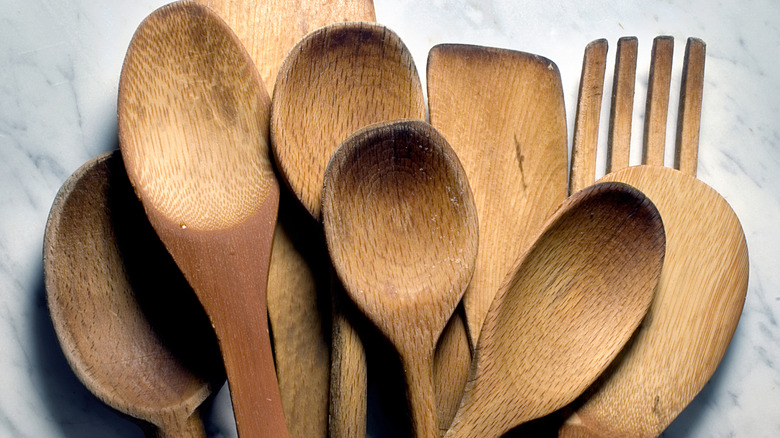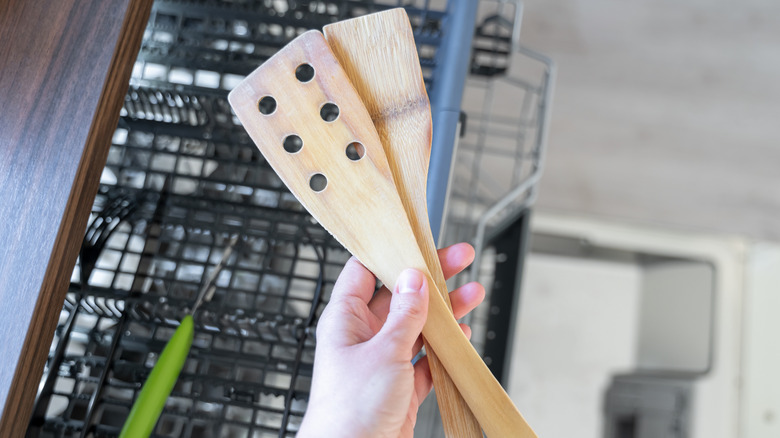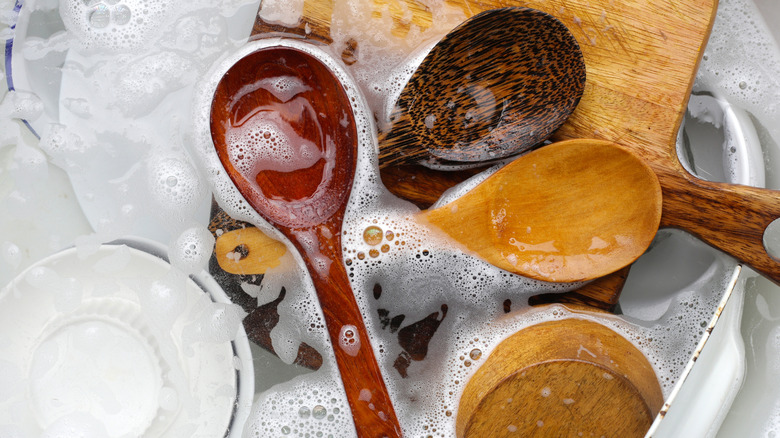Be Nicer To Your Wooden Utensils! Here's How To Take Care Of Them Properly
You're standing at your sink, staring down at your trusty wooden spoon, crusted with last night's tomato sauce. You shrug, toss it in the dishwasher for a cycle, and walk away. "It's wood," you think to yourself. "It's sturdy enough to handle this." But as sturdy and reliable as wooden utensils come, what happens next is a slow betrayal. Your once-dependable kitchen tool warps, cracks, and starts splintering — a home chef's nightmare.
It's safe to say that wooden utensils are the backbone of any kitchen — they stir soups, scrape pans, and help you perfect those family recipes — but they're often misunderstood. Sure, they're durable, but they're not indestructible. A little TLC can go a long way in keeping your utensils smooth, safe, and long-lasting. If you've been tossing them in the dishwasher or neglecting their upkeep, it's time to course-correct. Turns out there's no better way to maintain the longevity of your wooden utensils than the good 'ole fashioned way: hand-washing them.
Step away from the dishwasher
Let's get one thing straight: dishwashers and wooden utensils are not friends. Throwing your wooden spoons into the dishwasher might seem convenient, but it's a fast track to utensil ruin. Wooden utensils can last up to five years or even longer when cared for adequately and deep cleaned occasionally. They're antimicrobial, meaning they're pretty good at fighting off bacteria on their own, but it's important to take some extra steps to ensure they stay safe and sanitary.
"Don't boil the spoon or put it in the dishwasher — this will break down the wood fibers as well as the natural antimicrobial properties," food scientist and chef Tiffany Swan told Southern Living.
The high temperature and aggressive jets of water in your dishwasher can wreak havoc on wood. Wooden utensils are porous, meaning they absorb moisture. The hot, humid environment of a dishwasher causes them to expand, and the subsequent drying cycle shrinks them back down. Over time, this constant cycle leads to warping, cracking, and splitting.
If that's not enough, the heat and detergent in dishwashers also strips wooden utensils of their natural oils, leaving them dry, brittle, and more likely to splinter. And where there's cracks and splits, there's room for bacteria to grow and spread. So, if you've been tossing your wooden spoons into the dishwasher, stop now, and you may want to invest in some new utensils.
How to clean wooden utensils the right way
Putting in a little extra effort when cleaning your wooden utensils will save you from constantly replacing them. All you have to do is wash them by hand, using warm water and mild dish soap. Scrub gently with a non-abrasive sponge or cloth to remove food particles without damaging the wood's surface, and rinse thoroughly to ensure no soap residue lingers.
Pat your utensils dry with a clean towel as soon as you've washed them, and then leave them to air dry completely before their next use. Avoid leaving them to sit in the sink or on a wet counter — this can lead to swelling or mold growth.
Make sure to avoid cross-contamination and use separate utensils for raw meats and ready-to-eat foods. Inspect your wooden utensils regularly — if you notice they seem coarse, you can restore them by sanding them down with fine-grit sandpaper, washing with soap and water, and soaking them in mineral oil or linseed oil for 15 to 20 minutes. In fact, it's necessary to oil your wooden utensils every six months or so to prevent splintering and maintain their durability. If your utensils ever develop deep cracks, splinters, or persistent stains, however, it's time to retire your utensil.
To disinfect wooden utensils and cutting boards and eliminate any tough odors or stains, sprinkle some salt onto the surface, scrub the salt gently with half a lemon, baking soda, or a solution of one part vinegar and one part water, and rinse.


